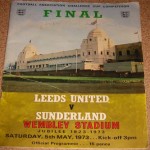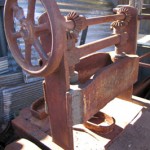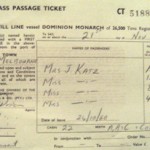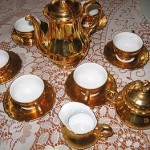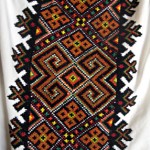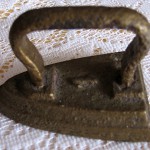Hungarian
Sarkad, Hungary
Naples, Italy in October 1949
Melbourne on 13 November 1949
Bonegilla and Wallgrove (Sydney) for 2-3 weeks at each hostel
Caravan at Berriman furniture factory, Matraville, Sydney.
My husband was a cabinetmaker at Berriman furniture factory and I worked there joining veneer.
Mother for two sons; factory dressmaker from home; and fabric work for Qantas.
I was born in 1923. I had been a country girl from just a small city, Sarkad [in] the eastern part of Hungary. My father was a well maker. My mother was a woman at home. I didn’t complete high school because in those days [it] was privately paid. The economy in the country was going down and my father’s job was very much tied to the seasons. His income was less, he couldn’t pay for my schooling. Then I went to learn dressmaking, privately.
When I was 19 I got married and my husband came from Romania of German parentage. Even in Hungary you could feel [the racism]; you know, when he’s got a good job, people were jealous. The [Second World] war, the Front, was looming in our area and coming closer. We decided to move away because of my husband’s [background]. My mother didn’t want us to go. My father and brother had to go away with the army so she wouldn’t leave the house by itself. But she survived and the house did too.
The Front was looming right behind us as we walked along. It was 1944 and we managed to walk to Austria in two weeks. We had only a bicycle, two suitcases, a sack, a pram. By then I had my first child – Fridrich was about 14, 15 months old – and I had been two months [pregnant] with my second son. I [was] pushing the pram and carrying the sack and my husband was pushing the bicycle with the two suitcases hung over. When a bombing raid came we’d be hiding in a ditch, next to the roadside, and in the nightfall, some people have given us accommodation.
The first day I tried to walk barefoot but your skin get thin and hurts and I’m pregnant and pushing the pram. The second day my feet got swollen. I couldn’t put shoes on so I had to tie my feet in sacks.
This little clock was our timing for the baby, to know what time it was when the baby was to have food, not just when he cried for [it]. Then we stopped and in this dish we cooked something for him, on the spirit cooker. We ate anything we could gather. We found some potato patch somewhere and some water. We just washed it and chopped it up and cooked it. So that’s our fate, we been refugees. Other people did the same things, not just we alone.
When we arrived in Austria my husband got a job straight away because there were very few men. He was a very good cabinetmaker. [We were] given a room [so] we can lie down. The neighbours brought us a cooking facility, little dishes, a stool and table to make it more liveable in this one room.
After about two months, my husband got called up to the army because he was German descent. They told him he either he goes to the army or a work camp. The work camp was as dangerous or sometimes even more than in war. They wouldn’t have looked after me and the children but because he chose to go to the army I got a small pension.
He has become a war prisoner by the Russians. With my pension and dressmaking, I was earning a little bit of money. While my husband was in war prison, I had been taken care of, the people were very nice. I still love Austria as much as my home country. They were wonderful.
After four years they released him from Russia; for two years, I did not know if he was dead or alive. I got a Red Cross card; it was two folds, one half I could send back to him. I have written 25 words: to tell him what I’m doing, how are we and our second child – he was born after his father had gone.
They released him in Romania. So with his friend they walked across Romania to Hungary and right across Hungary they walked across to the place in Austria where I [used to] live, where he left us. And actually he found the children on the street, they had been walking hand-in-hand and he recognised them from a photo I had sent with the Red Cross card.
He came back and worked for the same people. The atmosphere was that there was going to be a war continuing. You know how rumours are. He said, “I had enough”. We knew about immigration to Australia and applied. We got the journey to Australia as assisted migrants, Displaced Persons, in 1949. We didn’t belong to anywhere. We didn’t have to pay a fee. We had two boys – one was six, the other was four – and ten shillings in our pocket.
The SS Nelly sailed from Naples. It was so crowded – I think 1,600 [passengers] – we had almost standing room only. I was seasick from the first minute to the last; it was a very long journey because I was continuously sick. The journey was four weeks.
We arrived 13 November in Melbourne. The first impression was some wharfies on the dock and a man had big lettuce under his arm, breaking the leaf off and eating it. That’s what we had seen first. That was shocking to us. I had never seen that before!
We didn’t care much about anything, just getting off the ship. Then we got herded to some train, which was also very crowded. We made a couple of friends on the way. We still have one person who came with us; she is now 92, older than I. They had brought us to Bonegilla and we were [there] for two or three weeks. It’s a camp where it’s a big room and just beds, and that was your home, the one bed. For meals you had to go in a dining room and they fed us whatever they cooked. It was strange to us because we never eaten lamb before and it didn’t taste nice; probably it was mutton. It was food, we didn’t complain, we had a place where it was supposed to be peace. We had a wonderful, wonderful 50 year peace here.
They always separated the men from the women and children. The worry about it, you know, “Where are they sending him now? Or why do I have to carry everything and the children?” That was my complaint about Bonegilla.
From there they brought us to Wallgrove hostel, it’s here in Sydney, an old army camp. We arrived in the night with a train in Rooty Hill, then they had taken us by bus. When we had been there about three week, my older son got ill and they brought him to Prince Henry Hospital.
[Coincidentally] a cabinetmaker from Matraville [close to the hospital] had gone out to the camp and asked if any cabinetmaker had arrived. My husband got the job. The following week we hired a caravan – we could put it on the factory premises – and we moved into the caravan, from the camp, for 1½ years.
This was my husband’s first job in Australia. We felt good about living near the factory because we were together. It didn’t matter how little it [paid] because we were together. Then other people came similar way like we did and they had built little units on the back of the factory; bedroom and kitchen units for each family. There were about four families living there for about a year.
It’s okay, even I went and worked there joining veneer, you know the facia from the furniture you see. My husband cutting it out and I was joining it and he was gluing it to the wood.
I saved like crazy. When we had a little money, we have gone house hunting. In 1950 we had £50 together [and] my husband’s boss promised us he would come as a guarantor, so we have gone and bought this house in 1951.
The children were at Matraville School. They couldn’t speak English of course. At first when they were playing with others they say, “Mama, these people can’t speak”. I said, “They don’t understand you, you sound just the same to them”. But children learn very quickly and after the first week my children have been congratulated in the local paper, how well they learn to speak. In fact, the second year my older son jumped the class.
Finally we left the cabinetmaker and I have been dressmaking at home for a factory. I was always at home while the children went to school; I was here when they came home, that they didn’t become ‘latch key kids’ as they called them in those days. I applied for a licence for dressmaking and to do this job at home [which] I enjoyed. I have a very good rapport with the people for the 12 years I was doing that.
Later, when my children joined Qantas I said, “Why don’t you get me a job there?” And I did, I got the job. I have done a fabric job, mainly sewing, decorating the aircraft, changing seat covers or curtains, putting head rests on seats. I worked for Qantas for 18 years until I was retiring age, like 60.
My husband was a cabinetmaker for different people. He was very fine; he made all of this furniture and many more fancy ones. I have one [from] the early years when we come out here – just a little cassette. That’s what he did very first for me. I didn’t ask him, he just made it for me. He made this type of furniture in Austria.
[Since retiring], I have been a housewife, mother and almost ten years ago, when my husband passed away, I do handicraft. I joined the senior club in Little Bay in ’98 doing calligraphy and parchment craft.
I had a wonderful teacher and when she left, the management asked me would I take over. I protested I am not ready for teaching, but they saw my work [and] I just teach what I know. I taught for some years [and] had to give up the calligraphy because it takes a lot of relaxation time and practice, and I thought, “Where am I using it?” But with the parchment you are using cards all the time, so I carried on.
I am learning computer classes. My children gave me a computer and I took liking because I could email, I could be a lot closer to them. My older son moved overseas, wherever Qantas placed him; at the moment they are in L.A. (Los Angeles). The other son is in Alaska. Email is very useful; it has become a very important part of me.
I still have the little clock and dish even though I didn’t use them here. They are precious to me. Memory, sentimental memories!
Interviewed by:
Andrea Fernandes, NSW Migration Heritage Centre
24 October 2006
With assistance from Manuela Provenzano


![Elizabeth Mergl with dish "[En route] to Austria, we cooked for [the baby] in this dish. We ate anything we could gather. We found some potato patch somewhere and some water. We just washed it and chopped it up and cooked it. So that’s our fate, we been refugees. Other people did the same things, not just we alone."](../../../cms/wp-content/uploads/2008/10/photo220-286x400.jpg)
![(L-R): John, Elizabeth and Fridrich Mergl, Fürstenfeld, Austria, 1947 "My husband was released in Romania. He walked across to the place in Austria where I [used to] live, where he left us. And actually he found the children on the street - he recognised them from [this] photo I had sent with the Red Cross card."](../../../cms/wp-content/uploads/2008/10/image.jpg)
!["It was 1944 and we managed to walk to Austria in two weeks. By then I had my first child and [was] two months [pregnant] with my second son. This little clock was our timing for the baby, to know what time it was to have food, not when he cried for [it]."](../../../cms/wp-content/uploads/2008/10/clock-150x150.jpg)
!["My husband was a fine cabinetmaker. I have one [item from] the early years when we come out here - just a little cassette. I didn’t ask him, he just made it for me. He made this type of furniture in Austria."](../../../cms/wp-content/uploads/2008/10/timber-150x150.jpg)
!["[En route] to Austria, we cooked for [the baby] in this dish. We ate anything we could gather. We found some potato patch somewhere and some water. We just washed it and chopped it up and cooked it. So that’s our fate, we been refugees. Other people did the same things, not just we alone."](../../../cms/wp-content/uploads/2008/10/dish-150x150.jpg)
